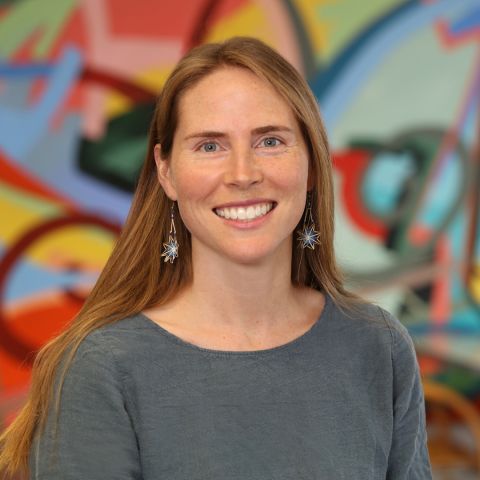
Professor Lindsay Borrows has been named the inaugural holder of the Queen’s Law Professorship in Indigenous Law & Governance.
“Since joining Queen’s Law in 2022, Lindsay Borrows has had a meaningful impact on areas of Indigenous legal traditions and legal education and research,” says Dean Colleen M. Flood. “We are thrilled for her to hold this prestigious and much-deserved position and look forward to what she will achieve with the support of the professorship.”
Established to recruit and support an Indigenous legal scholar, the five-year professorship advances Queen’s Law’s vision to be a centre of excellence in teaching and research in Indigenous legal issues. It provides funding for lectures, conferences, research, and student supervision in Indigenous legal studies.
“The funds help me apply Anishinaabe legal methods and pedagogies for teaching, recognizing the classroom can live outside the formal law school building,” says Borrows.
Some funds will be used to deepen the land-based and community-engaged courses Borrows has developed, known as the Anishinaabe Law Camp. This fall, the course was offered at the Chippewas of Rama First Nation. In past years, students learned on the land at Neyaashiinigmiing, Ont. (Chippewas of Nawash First Nation), and at the Elbow Lake Environmental Education Centre north of Kingston. Support covers costs such as Elders’ and knowledge keepers’ honoraria, research assistance, creative learning supplies (e.g., art materials, journals), and travel, food, and camping accommodation.
“My courses advance reconciliation by introducing students to key questions and methods related to the revitalization and application of Indigenous laws in Canada,” she explains. “The Truth and Reconciliation Commission was clear that there is no reconciliation between Indigenous and non-Indigenous peoples without also reconciling ourselves with the Earth and the many more-than-human beings who share our homes. The land-based components of my courses seek to show possibilities for how students can tend to these land-based relationships that are central across Indigenous legal orders. Students leave with a greater capacity to support Indigenous-led legal resurgence in their future practice.”
The professorship also supports Borrows’ innovative research.
“My research contributes to reconciliation by taking seriously Indigenous peoples’ own laws as sources of authority for contemporary application,” she says. “I invite JD and graduate students into this research path so they can see possibilities for braiding their future legal practice with both the common law and Indigenous laws.”
One project examines how Anishinaabe First Nations across the Great Lakes region are writing down constitutions, or Chi-Naakonigewin. Borrows has hired research assistants to help communities draft these constitutions. “It is complex to distill legal traditions found in oral stories, ceremonies, and land-based practices into written documents in English,” she says.
Another project explores how artificial intelligence and digital technology, such as legal search engines, might support First Nation communities. Borrows is attending technical workshops and scholarly conferences, consulting with experts, and working with graduate and JD students to explore how Indigenous communities might design online legal databases for use in community tribunals or courts.
“There are many complexities in translating laws into digital formats, and in the era of artificial intelligence and the need for data sovereignty this is further challenged,” she says. “And yet, there are great possibilities to advance access to justice through Indigenous laws if digital technology can support their application.”
Beyond her teaching and research, Borrows has also contributed to key initiatives at Queen’s Law. She is a member of the Queen’s University Indigenous Knowledge, Curriculum, and Research Working Group and the Queen’s Law task force that developed a new first-year course in Indigenous and Aboriginal Law to be introduced in winter 2026. She is also a key collaborator on the vision for an Indigenous-led community legal centre in partnership with the Kingston Native Centre and Language Nest and Queen’s Law Clinics.
By Lisa Graham